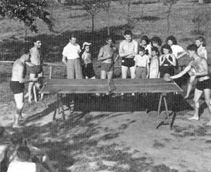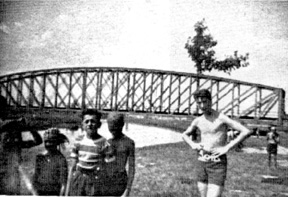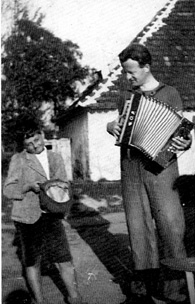
Day after day, John, Beda, and the other children returned to the swimming hole, where they found their friends. They spent the warm days playing sports. Soccer was always the favorite, but volleyball was a close second. On weekends, even adults would come out to watch and play. By July, two table tennis tables had appeared on the playground. As long as it was not too windy, the children could play table tennis outdoors, smashing the balls with their well-worn paddles.
The balls from these sporting events often ended up in the waters of the Vltava. The river in this part of town was cold and the current was dangerous. But worse than that, the water was filthy. Raw sewage floated on the surface. Debates raged over who was going to retrieve a ball lost in the water – but not for too long, or the ball would disappear forever, swept away by the fast-flowing current. Eventually some brave person would wade out to rescue the ball and return it to shore, and the games would continue, only to stop again when the ball once more sailed into the river!

A game of table tennis at the swimming hole. Ruda is the tall boy in the center, wearing a bathing suit. John is the second boy to Ruda’s right.
When it was very hot, the children went swimming. The first time John and Beda went for a swim, they held their breath and closed their eyes. “Whatever you do,” said Beda, “don’t put your head underwater.” John agreed wholeheartedly. The river stank. But the air was stifling hot, and even this foul water was inviting, so the boys waded in and dunked themselves. Some young people even had inner tubes, and lazily drifted by.
John always kept a lookout for Tulina. From the corner of his eye, he watched to see if she was looking his way. If she glanced at him, or smiled and waved, he was pleased.
Everyone had to pay to enter the playground, about ten Czech cents for a younger child, and twenty cents for older youth. Even though money was hard to come by, John’s parents always gave him the change he needed to go to the swimming hole. The boy who took the money was the one who cleaned up the cabin and the whole area. He had been hired by the parents to keep an eye on things at the swimming hole, and he insisted on being paid for his services. “Ten cents,” he ordered, as John and the others lined up to get inside.
“What if we don’t pay you?” shouted one boy, who was pushing to get close to the front of the line.
“If you don’t pay, I’ll close the place up,” the boy shouted back. “Everyone has to pay to get in.” He did not really have the authority to close the swimming hole, but no one wanted to argue too much.

John (wearing the bandana) and his friends at the swimming hole.
“I’ll give you five cents,” a young girl countered, reaching into her pocket for the change.
“Ten cents, or you can forget about coming in.” That was the final word: everyone had to pay. And, like it or not, they couldn’t be in the swimming hole without the boy. He was also the lifeguard. He swam out to rescue the weaker swimmers, who were sometimes pulled away by the strong undertow.
When the weather was bad, the old shack was the place to go. It was rundown, with rotting boards that creaked if the wind blew too hard, but it provided much-needed protection from rain. There the children sang and played indoor games. John and Beda’s ongoing chess competition was fierce. Beda was quiet but very smart. Even though he was younger than John, he was the one who usually won at chess.
Each day, on the way to the swimming hole, John would look for the candy vendor. The children called him old Mr. Papa, and his wagon was always full of candies, apples, and chocolate bars. He could be found in the shade of the large railway bridge, close to the swimming hole. Whenever he could afford it, John bought a chocolate candy ball from Mr. Papa. Children lined up to buy the treats, and those who had no money stood nearby, eagerly hoping for a bite of candy from a generous friend.

John and Karli Hirsch at the swimming hole.
At the end of every day, as evening approached, the children knew they had to get home. One by one they left the playground, reluctant to abandon their friends and their games. By seven o’clock, those on foot began their trek home. By seven-thirty, John and the others who rode bicycles knew that they had to leave as well. It was getting late, and the curfew would soon take effect; Jewish people caught on the street after eight o’clock were punished.
As John climbed onto his bicycle each evening, he looked back at the playground, and he knew he would return first thing the next day.